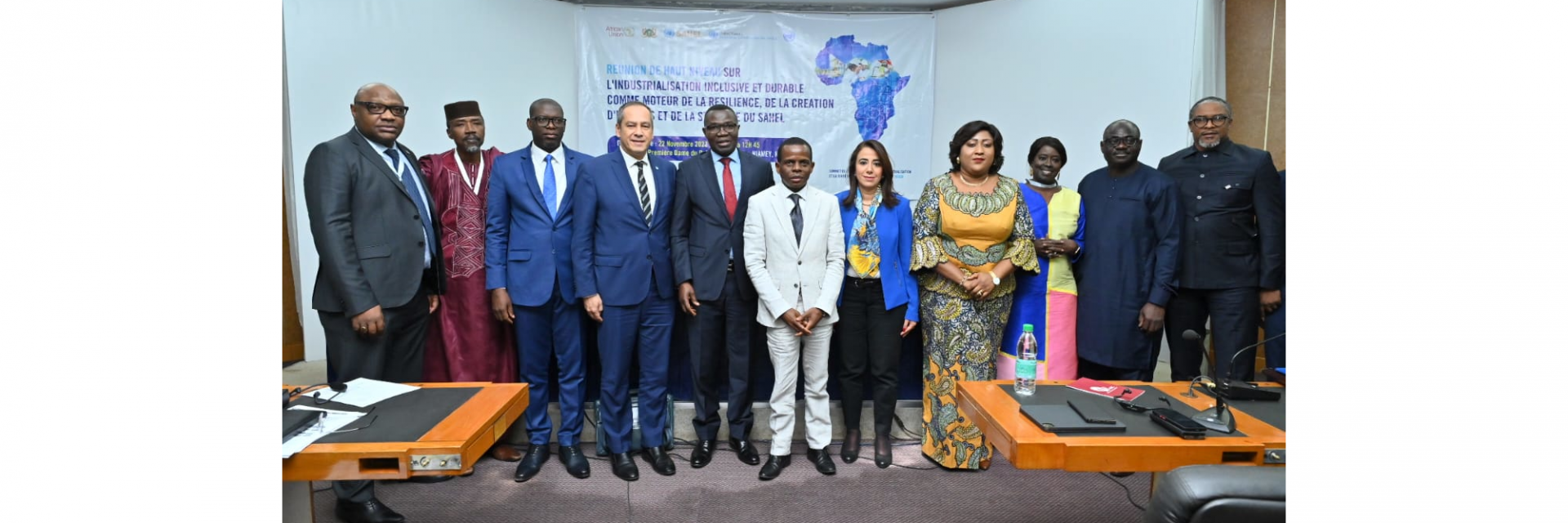Niamey, Niger, November 24, 2022 - As part of the African Union Summit on Industrialization and Economic Diversification being held November 20-25 in Niamey, Niger, a side event on inclusive and sustainable industrialization as a driver of resilience and stability for the Sahel was organized on November 22 by the Government of Niger, the African Union, the United Nations Economic Commission for Africa (UNECA) Subregional Office for West Africa, the Office of the Special Coordinator for Sahel Development, and the United Nations Industrial Development Organization (UNIDO).
The objectives of this side event are essentially to present a new narrative for the Sahel based on the opportunities for youth and women offered by industrialization and economic diversification, to sensitize private and public sector participants on the potential of agribusiness activities in various value chains to further support resilience in the Sahel through growth and job creation, to create a better understanding by participants of the strategic investments needed to support agribusiness in the Sahel, and to present Niger's industrial priorities and best practices.
For the Minister of Industry and Youth Entrepreneurship of the Republic of Niger, Ms. Salamatou Gourouza, "We tend to forget the youth and women. We cannot achieve industrialization or economic diversification if we do not include them in the industrialization value chains.
"The issue of inclusive industrialization in the Sahel is of prime importance," added the Minister of Industry and Youth Entrepreneurship of the Republic of Niger.
In his intervention, ECA Acting Executive Secretary, Mr. Antonio Pedro said that eight of the fifteen countries making up the West African sub-region are Sahelian and given the challenges the Sahel is facing, it is extremely important to invest in industrialization in order to change the narrative in this part of the continent, which today is synonymous with conflicts and humanitarian needs.
"At the level of intra-African sectoral trade, it is estimated that full implementation of the AfCFTA will increase exports in agribusiness by 41%, industry and services by about 40%, and energy/mining by 16% by 2045. In West Africa, including the Sahel region, exports are expected to increase by 24.0% in industry, 23.0% in agribusiness, and 11.0% in energy and mining. As a result, in absolute terms, nearly three-quarters of the gains in exports from West Africa to Africa would come from industry," said Antonio Pedro.
The ECA Acting Executive Secretary also stated that "transforming economic structures is one of the five strategic foresights towards achieving the SDGs directly aligned with inclusive and sustainable industrialization. Structural transformations remain one of the major challenges of the countries of the Sahel with the industrialization as the main channel to achieve it”.
The Special Coordinator for Development in the Sahel, Abdoulaye Mar Dieye on his turn, emphasized the need to have a coalition of African industries, especially the private sector, small and medium enterprises and youth, as driving forces for industrialization in the Sahel and Africa in general.
Abdoulaye Mar Dieye said that "the time for speeches and strategy design is over. Niamey Summit must be a time for action to change the narrative of the Sahel”.
The UNIDO Representative in Senegal, Christophe Yvetot, deplored the rank occupied by Africa in terms of industrialization.
"With 17% of the world's population, the African continent has only 3% of the wealth, an absurd situation that must be reviewed," said Christophe Yvetot.
"To get out of this rut, industrialization is the right way because by boosting industry to 10%, we reduce poverty by 70%," explained UNIDO Representative in Senegal.
"The industrialization of Africa is possible, it is just a matter of leadership, access to land and energy, Agro-Industrial Poles establishing, barriers reducing and governance improvement, "he concluded.
For further information, please contact: Tahirou Gouro, Communication Officer, ECA-SRO/WA Email : gouro2@un.org,

